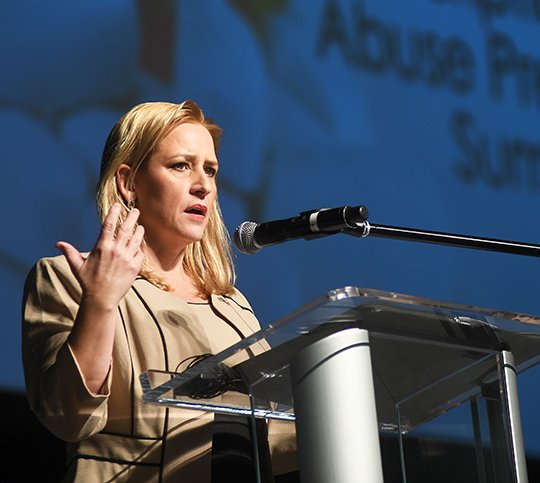Nashville Drug Enforcement Agency Special Agent Stan Jones described "the perfect storm" that has led to a prevalence of the deadly synthetic opioid fentanyl, which is 50 times more potent than heroin, during a statewide summit in Hot Springs Thursday.
Jones was among the law enforcement officers who addressed the sixth annual Arkansas Prescription Drug Abuse Prevention Summit Thursday at the Hot Springs Convention Center.
The summit was hosted by Arkansas Attorney General Leslie Rutledge, the state office of the drug director, the Arkansas State Board of Pharmacy and the Criminal Justice Institute.
The summit, which serves as a free training and educational opportunity for law enforcement officers, medical professionals, pharmacists and educators, was attended by over 1,000 people -- a record, according to a news release from Rutledge.
"Prescription drug misuse and abuse continues to be one of the main issues concerning all Arkansans," Rutledge said in the release. "This summit is one more important avenue for those working to solve this crisis -- medical and law enforcement professionals -- to educate themselves about and identify new treatment and educational opportunities. There is no one solution, but there is one mission -- saving lives. I am proud of the partnerships that have once again come together for this record-setting event."
Jones focused during his talk on fentanyl, a synthetic opioid originally manufactured with the purpose of relieving extreme cases of pain through a medically prescribed patch. He said it has taken on an illicit function in recent years, namely being used to lace other opioids for an extra kick.
Centers for Disease Control and Prevention estimate that heroin and fentanyl were responsible for more than 25,000 deaths in the United States in 2015. At 27, Garland County was second in Arkansas in deaths per 100,000 people due to opioid abuse in 2015.
Jones noted one example of fentanyl manufacturing he encountered in a rural part of Tennessee. "We need to get away from the idea that it only happens in big cities," he said. "This is happening here."
Jones said the surge of fentanyl stems from a market filled with addicts. He said he was recently asked by a woman whose son died from a fentanyl-laced heroin overdose why dealers sell drugs that kill their clientele.
"When someone dies, there will be someone to fill that void. There will be another patient that is climbing the ladder -- not intentionally, but going up in their addiction," Jones said, citing patients who were initially prescribed an opioid like hydrocodone.
On the money front, Jones noted a "kilo," or 1,000 grams, of fentanyl costs $10,000. Since 1 milligram of fentanyl is commonly used to lace a "point," or 0.1 gram, of heroin for a $20 product, fentanyl has a return investment of $20 on the penny.
"As long as there's that profit margin, there's gonna be people that are gonna want to make that kind of profit, and as long as we have the disease of addiction that we have, we have the perfect storm," he said.
Jones said 2 milligrams of fentanyl, which can be ingested into the body through the eyes, mucus membranes, sinus cavities, mouth or skin, can kill a human.
The manufactured fentanyl pills are embossed with Rx lettering to give the impression of a genuine opioid prescription. They are produced with coffee grinders, stand mixers and illicitly sold pill pressers.
Jones said the pills present a serious risk to addicts who think they are taking prescribed opioids.
"We're talking about people who can have a pill in their hand, and then they put it back in the bottle, and then their nose itches or they wipe their eye, and then they fall on the floor," he said. "It's that bad."
Jones said the solution for first responders dealing with fentanyl is water, as it is a water-soluble substance. He said a drug raid that ended when he and his supervisor left a placard-marked car full of fentanyl in the backyard of two suspected manufacturers' residence would have gone differently with such knowledge.
"You put 80 milligrams of anything that is water-soluble, mix that with 1,000 gallons of water and let it soak the front yard of the home. Now 80 milligrams has been dispersed in 1,000 gallons of water," he said. "It's not going to come back."
Jones said first responders should spend whatever money is necessary to obtain equipment to preserve their safety and Arkansas needs to provide them with the opioid counter-agent Narcan, which "is for everyone involved."
"We're going to be doing more of this," Jones said. "The fire department will be doing more of this, and EMS personnel will be doing more of this as we do this."
Local on 11/10/2017